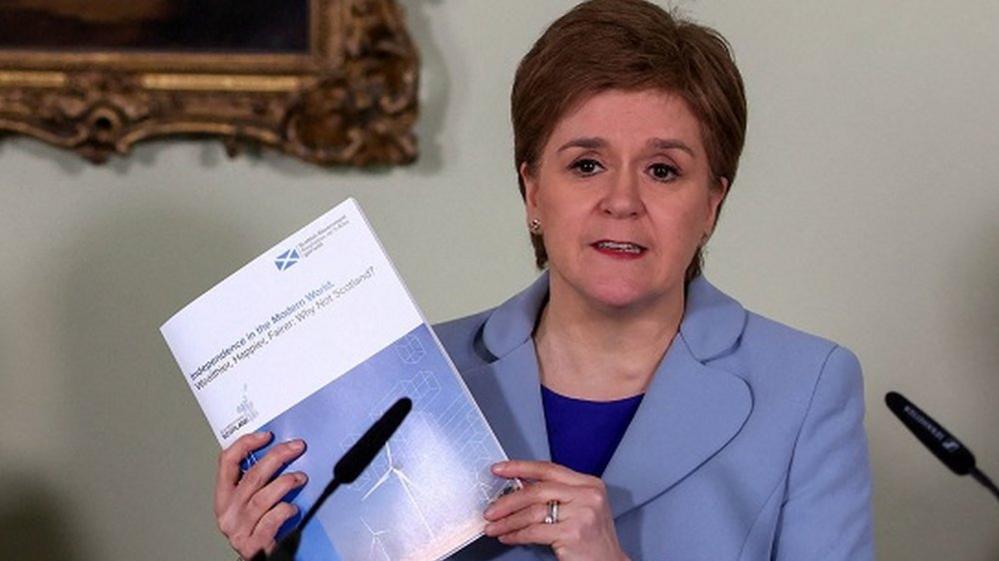At a glance: Scottish government publishes independence paper
- Published
First Minister Nicola Sturgeon has launched the first in a series of papers which she says will set out and debate the case for Scotland's independence.
The first paper is entitled: "Independence in the Modern World. Wealthier, Happier, Fairer: Why Not Scotland?", external
It looks at 10 "comparator countries" - Denmark, Sweden, Finland, Norway, Iceland, Ireland, Switzerland, Austria, Belgium and the Netherlands - and compares the UK's performance across a range of economic and social indicators.
Ms Sturgeon said these independent countries were a similar size to Scotland but were wealthier, fairer and more productive than the UK.
Comparisons to the UK
The paper says all the comparator countries are wealthier than the UK, as measured by GDP per head of the population, and the gap has been maintained over the long term.
Income inequality is lower in the comparator countries and poverty rates are lower.
Most of the comparator countries have a smaller gender pay gap and all have more social mobility.
They also have higher productivity and most spend more on research and development.
It says the comparator countries have achieved lower debt and deficits but notes the global financial crisis had a more severe impact in some countries than others.
Ireland and Iceland faced massive fiscal challenges in the wake of the global financial crisis, but recovered more rapidly than was widely predicted.
Different models
The second section of the Scottish government paper seeks to highlight some of the factors that help explain the better performance of the comparator countries relative to the UK.
Benefits: It says a key aspect of the comparator countries is the relative generosity of out-of-work benefits
Tax and public spending: The structure of taxation across countries varies significantly. Ireland and Switzerland, where tax and spending are relatively low, have chosen developmental paths quite distinct from the higher spending, higher tax Nordic nations. Evidence suggests that higher confidence in government is correlated with higher levels of willingness to comply with taxes.
Labour market policies: The paper says Denmark's 'flexicurity' labour market has often been held up as a model for Scotland. It has a very high spend on labour market policies - government programmes that intervene in the labour market to help the unemployed find work. All the other comparator nations spend significantly more than the UK where spend is exceptionally low.
The paper also looks at Sweden's job security councils and the Danish disruption council as well as social partnership models
UK model
The paper says commentators have attributed the UK's relatively weak productivity and relatively high income inequality to the short-termism resulting from the UK's distinct approach to ownership and governance, the failure to develop effective institutions, and a lack of commitment to industrial strategy.
The paper says the UK has a very distinct approach to ownership and corporate governance.
The UK is much more open to foreign buyouts, has a low prevalence of public ownership and a particularly active market for corporate control.
The UK has more fragmented shareholding and a low prevalence of large family-owned firms.
It says that financial market pressure for short-term returns to shareholders had been an obstacle to investment
The UK's labour and product markets are among the most deregulated in the advanced world. The paper says it has been argued that this encourages firms to adopt "low road" approaches to competitiveness through cost minimisation and work intensification rather than "high road" approaches based on patient investment and greater focus on skills.
Conclusions
The Scottish government's paper acknowledges that an independent Scotland could not be transformed to match the success of the comparator countries overnight.
But it says the comparator country models - especially the Nordic countries - illustrate the range of choices that would be available to an independent Scotland able to pursue different policies from those adopted by Westminster over many years.
Independence by itself will not guarantee improved performance, it says.
The government says it welcomes a national debate about how an independent country can create a wealthier, happier and fairer Scotland.
Related topics
- Published14 June 2022

- Published14 June 2022

- Published14 June 2022
